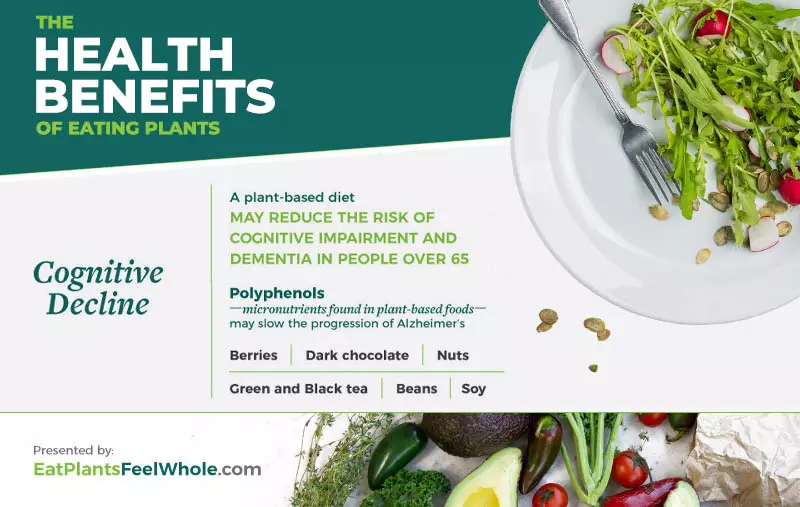- AdventHealth

Our minds are beautiful and complex. They hold precious memories and give us the power to think through tough problems — or simply decide what’s for dinner.
We often take our minds for granted. But as we grow older, we become more aware of the realities of cognitive decline, making it a good time to look for ways to keep our gray matter going strong. As it turns out, eating plants may play an important role in staying sharp.
What Is Cognitive Decline?
We need our cognitive abilities, like processing and memory skills, for just about anything we do. That includes being focused and solving problems.
You may know what it’s like to blank out or have a “senior moment.” Maybe you’ve struggled to trace your steps back to where you left your wallet. Or forgotten a name you once knew well. These experiences are a natural part of aging and nothing to worry about as long as they don’t happen frequently or affect your quality of life.
With cognitive decline, however, there’s a slight yet noticeable drop in mental abilities compared with others who are the same age.
There aren’t any medicines that are proven to work in patients with cognitive decline. That makes it all the more vital to think of the foods you eat as a kind of treatment. Meaning, a plant-based diet may help you hold on to your essential memory and thinking skills.

Plants as Brain Food
Research shows diets that are rich in leafy green vegetables, like romaine lettuce and spinach, may help protect against cognitive decline. There’s also reason to believe the same diet that’s good for your heart — one that’s rich in vegetables, fruits, whole grains, and healthful fats — can be good for your mind, too.
There are a number of nutrients that come into play in these foods. While this isn’t meant to be a complete list, these are six superstars that stand out when it comes to brain health.
Antioxidants
Antioxidant vitamins, such as C and E, are found in whole vegetables including tomatoes, broccoli, kale, sweet potatoes and spinach; fruits like avocados, peaches and blueberries; nuts including almonds and walnuts; and herbs and spices such as ginger and garlic.
Omega-3s
These fatty acids are found in flax, walnuts, chia and hemp seeds.
Phytonutrients
These nutrients can lower inflammation, which affects the brain. Look for phytonutrients in strawberries, blueberries and raspberries.
Polyphenols
Polyphenols are micronutrients that are found in plant-based foods — such as berries, dark chocolate, nuts, green and black tea, beans and soy — and can slow the progress of your brain’s decline.
Vitamin B12 and Folate
You can find these nutrients in dark green vegetables including asparagus, broccoli and Brussels sprouts.
Water
Keeping the body and brain hydrated has long-term benefits for your health. Drink up and also enjoy foods with high water content like watermelon, lettuce, pineapple, celery and cucumber.
The Brain and Biome Connection
Researchers are learning how the food we eat and how we digest it may cause changes in the brain. One of the things they’re finding is that the gut biome — where viruses, bacteria and other microbes live in the digestive system — may affect cognitive decline. For instance, one study showed a difference in the elements that make up the gut biome in people with mild cognitive decline versus people who have normal cognition.
Research also shows a link between changes in the gut biome as people age. These changes include:
-
Disorders in the immune system
-
Problems with ongoing inflammation
-
The presence of chronic diseases, such as Alzheimer’s
There’s still a lot to explore about how these changes relate to each other and to changes in the brain leading to cognitive decline. But the bottom line is that you’ll want to have mostly good bacteria living in your gut.
Eating highly refined, low-fiber foods causes the bacteria in our intestines to go from good to bad. That’s because a low-fiber diet tends to grow bacteria in the gut that causes problems and crowds out good bacteria. Sticking with a high-fiber, plant-based diet can help the body — and brain — fight inflammation.
Mind What You Eat
While there’s no such thing as a smart fruit or vegetable, there’s certainly smart eating. That’s what can help your brain create, remember, learn, focus and think clearly. Use fresh foods to help keep your beautiful mind going strong.
Learn more about how to implement a plant-based diet.


